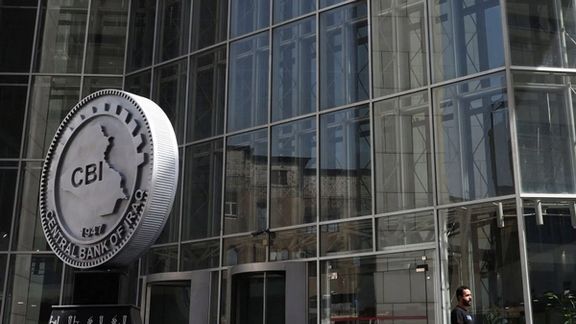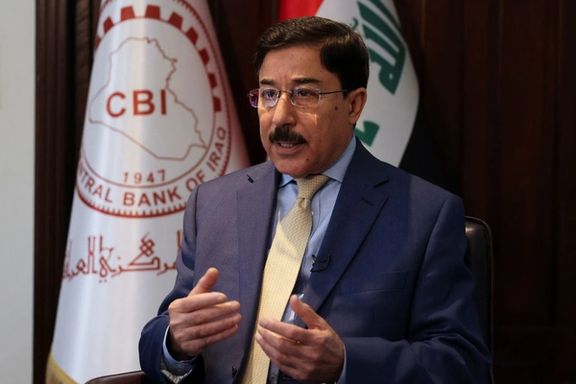Iraq Raises War Cry Against ‘Dollar Smugglers’

Iraq’s central bank governor Ali al-Allaq says the country has started a war against its banking system being abused for currency smuggling.

Iraq’s central bank governor Ali al-Allaq says the country has started a war against its banking system being abused for currency smuggling.
"It is really a battle, because the people benefiting from this situation and those harmed (by the new measures) will try in various ways to continue their illegal activities," Allaq told Reuters, referring to implementing US dollar supply restrictions on Iraq to prevent smuggling of banknotes to Iran.
Allaq did not mention Iran by name and said he did not have data on how much of Iraq's dollars has been smuggled to Iran or other neighboring countries, including Turkey and Syria, before the United States tightened regulations in November.
Muhammad Nuri Aziz, a member of the Iraqi parliament, said on a television show last week that Iraqi Prime Minister Mohammed Shia al-Sudani and the country’s central bank are aware of the schemes Iran uses to get hold of US dollars it desperately needs amid US sanctions. The lawmaker noted that the smuggling started during Mustafa Al-Kadhimi's term as prime minister and still continues. Without providing any context or details, the Iraqi lawmaker alleged that Iran prints Iraqi dinars in Argentina, exchanges the money to US dollars in Iraq, from where it is smuggled to Iran by trucks.
Reuters’ Timour Azhari said in a report, “Iraq's government is reliant on Washington's continued goodwill to ensure oil revenues and finances do not face US censure, but it came to power with the support of powerful, Tehran-backed groups and so cannot afford to alienate Iran. The latter groups have accused the US of meddling in Iraq's internal affairs and creating a currency crisis, as businesses either struggling or unwilling to abide by the new measures sourced dollars from exchange shops, driving down the value of the Iraqi dinar.”

Iraq has more than $100 billion dollars in reserves, Allaq said, but could not freely intervene in the market to bring the rate down due to the restrictions.
Late in July, 14 Iraqi private banks sanctioned by Washington as part of a wider crackdown over helping to siphon US dollars to Iran said they were ready to challenge the measures and face audits and called on Iraqi authorities to provide assistance. The credibility of the Iraqi banking system has been tarnished due to the Islamic Republic's influence, and US financial restrictions have tightened on Baghdad because evidently all Iraqi banks have had interactions with the Islamic Republic.
The US barred the Iraqi banks from conducting dollar transactions as part of a wider crackdown on dollar smuggling to Iran. The latest sanctions, along with earlier ones, have left nearly a third of Iraq's 72 banks blacklisted, two Iraqi central bank officials said. The dinar has been falling against the dollar since the New York Federal Reserve imposed tighter controls on international dollar transactions by commercial Iraqi banks in November to halt the illegal siphoning of dollars to Iran.
Allaq said that action related to transfers from 2022, before a new platform that aimed to improve transparency went live. He said the central bank was undertaking a review of the banking sector and introducing new regulations that he said would likely see some banks close.
"It would be very normal in the coming period to see a reduction in the (number of private banks)," he said. "There are always side-effects, but at the same time we have a responsibility to protect the country's interests by trying to find the necessary means for monitoring and oversight so as not to expose the country to any issues on this front," he said.
'TRANSFORMATION'
The US measures have targeted Iraq's so-called dollar auction, where the central bank requests dollars from the US Federal Reserve before selling them to commercial banks, which in turn sell the funds to businesses in the highly import-dependent economy.
US and Iraqi officials have said the auction allowed large sums of money to be illegitimately acquired by groups who would provide fake invoices and then either transfer or physically smuggle the funds to neighboring countries, chiefly Iran.
A feature of a highly informal economy, the system was also used by thousands of small businesses that are not registered with the state, Allaq said, a widespread phenomenon in Iraq that allows them to dodge taxes and customs fees.
Since January the central bank has asked banks to provide detailed information on senders and recipients of transfers via an online platform.
When companies began trying to use the platform in January, less than 20% of requests were approved by US authorities, Allaq said. That number had now risen to around 85 percent, signaling growing ease with the new regulations, he said.
"It is not just an electronic platform, it will lead to a total reorganization of trade and the movement of money, and control on a lot of avenues for suspicious activity."
(With Reporting by Reuters)